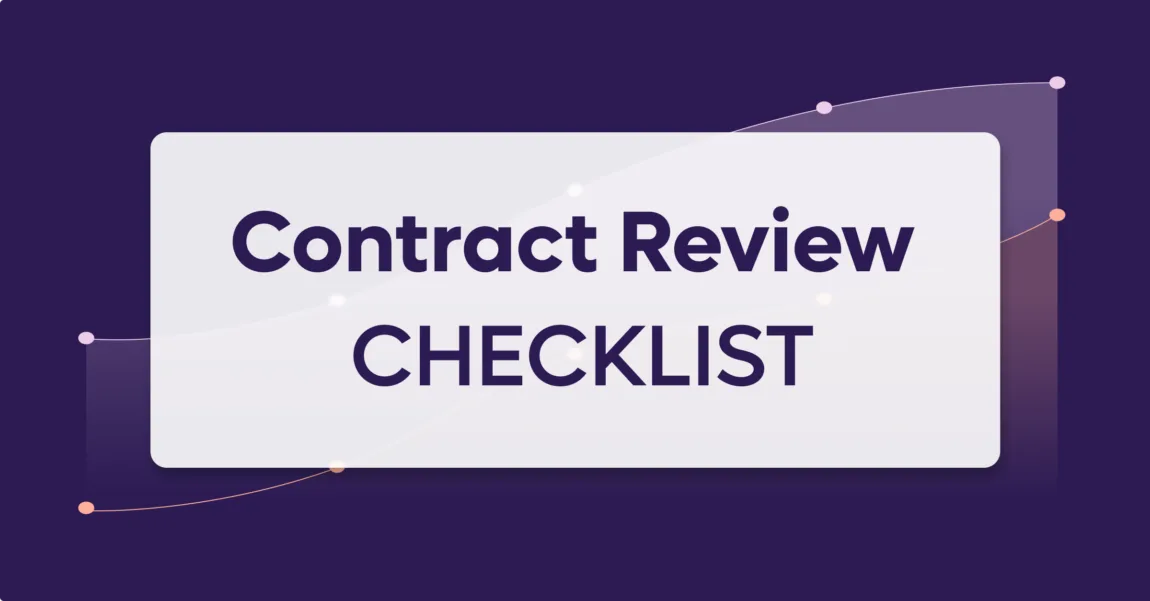If you sign a contract, you’re responsible for upholding its terms. So any signed contract, agreement, or terms and conditions can have implications for the future of your business, and the nature of the relationships with your customers. Once an agreement is signed, both parties are legally bound.

It’s critical to ensure that its terms are clearly and accurately written. Whether it’s an NDA or a DPA, a contract review checklist is a must-have to double-check what you’re signing, show customers you have professional procedures in place, and see exactly how you’re legally covered.
What is contract review?
Contract review is the process in which you read, understand, and revise your contracts to meet the requirements of a business negotiation. Some companies present contracts expecting them to be signed without question. But in most cases, the terms of a B2B contract are negotiable.
If your customers are seeking to negotiate the terms of your contracts, it’s all about balancing the need to protect your interests and close the deal.
Don’t fall into the trap of thinking that just because you can add more to protect yourself in the way of provisions, that means you should. Be honest with yourself about whether a particular risk is something you need to shift onto the client or not. A business contract review aims to agree on a framework for a long-lasting and mutually beneficial relationship.
Why is contract review important?
Risk mitigation
A well-conducted contract review identifies potential risks and ambiguities, to address them before they become problematic. This proactive approach can save your business from legal disputes and liabilities. Think of it as a strategic move to maintain your company’s integrity and operational stability.
Ensuring fair terms
Reviewing a contract ensures that the terms are fair and balanced. This is your chance to spot clauses that might be too constricting or skewed against your business interests so you have the foundation for negotiations.
Legal compliance
Contracts must comply with relevant laws and regulations. A thorough review confirms that every contract adheres to legal standards, helping you navigate regulatory requirements. This is crucial for avoiding legal pitfalls that could result from non-compliance. E.g., penalties or invalid contracts.
How to review a contract
It’s in your best interest to be comfortable enough to move forward with the written terms stated in the document. If not, consider identifying and making the necessary revisions before getting locked into an agreement.
The terms of the contract need to be carefully analyzed, all critical missing terms inserted, and unfavorable terms revised (or removed altogether). If you find errors and discrepancies that seem out of place, or questions arise as a result of reviewing the contract, it’s best to step back and negotiate.
Once a contract is signed, you can’t change it easily. So identify, assess, and revise the terms as much as necessary during the contract review process, not after. Make sure you’re OK with what you’re signing.
How long does it take to review a contract?
Depending on the contract length, service, complexity of terms, boilerplate versus bespoke language, and the relationship between contracting parties, reviewing a contract can take anywhere from 4 to 8 weeks. For instance, a straightforward contract with boilerplate language that your business uses routinely can be radically different from a bespoke business contract review.
What to look for during a contract review?
Here’s what to look for in a contract review.
Key elements to check
- Parties involved: First and foremost, clearly identify the parties involved. This means verifying the full legal names of all individuals and/or entities entering into the agreement. Any mistakes here can lead to complications down the line, especially if there’s a need to enforce the contract in the future.
- Terms and conditions: This section outlines the rules governing the contract, specifying what each party is obligated to do. Understanding these obligations helps you see what’s expected from all sides and whether the responsibilities are fair.
- Duties and Obligations: The backbone of any legal agreement, acting as a framework that dictates the responsibilities of each party.
- Payment Terms: Payment terms break down how much is paid, when payments will be paid and how payments will be made, what triggers a payment, and what penalties may apply for late payments. Making sure these terms remain clear and reasonable can avoid disputes and financial stress.
- Termination Clauses: The conditions under which the contract can be terminated and what the consequences might be. Whether you’re looking to exit the contract early or protect yourself against the other party doing so, grasping these terms can save you from unexpected penalties.
- Confidentiality clauses: If you’re dealing with sensitive information, confidentiality clauses also warrant careful review. These clauses dictate what information must be kept confidential and for how long. Misunderstanding these terms may result in accidental breaches, which could have legal repercussions.
- Dispute Resolution: How disputes will be resolved. Many contracts include a section on dispute resolution, detailing whether conflicts will be handled through mediation, arbitration, or litigation. The method chosen can significantly impact how any disagreements are addressed.
- Legal Compliance: Confirm compliance with laws in order to minimize risk and enhance operational success.
Common red flags
- Vague Terms: Clear up language that can lead to misunderstandings and disputes.
- Unilateral Amendments: Remove clauses that allow one party to change terms without consent from the other party.
- Automatic Renewals: Clauses that automatically renew the contract without explicit agreement.
- Excessive Penalties: Question the value of disproportionally high penalties.
- Exclusivity Clauses: Clauses that restrict your ability to work with other partners or clients in your industry. Limits your business opportunities and growth.
- Liability and Indemnity Clauses: Clauses that place excessive liability on you or require broad indemnification of the other party. You could be held responsible for risks beyond your control.
- One-Sided Clauses: Clauses that disproportionately benefit one party, such as allowing unilateral changes or imposing harsh penalties on you.
Contract review process
The contract review process often includes multiple stakeholders, depending on the nature of the contract and the parties involved.
Initial drafting and review
The process begins with a sales rep or project manager who drafts the initial contract. This individual decides the key terms and values, often using a standard template as a starting point. It’s crucial that this person carefully reviews the entire agreement for accuracy and completeness before forwarding it to the counterparty and the legal team.
Counterparty review
The counterparty will then review the proposed agreement to ensure that the legal, risk and commercial implications are acceptable. This involves an examination to balance the interests of both parties. It’s best practice for a contract specialist or legal counsel to review the contract after each round of negotiations and before the final signature.
Legal and contract specialist review
Contract specialists or legal counsel play a vital role in reviewing the contract during the negotiation stages and before it’s signed. Their expertise ensures that the terms are legally sound and that the company’s interests are protected. This represents the last chance to identify and request changes before finalizing the agreement.
Obligation management
Once the contract is signed, the focus shifts to obligation management. This involves tracking critical dates and deadlines to ensure compliance with the terms of the agreement and anticipating specific contracting events such as renegotiation windows or opt-out clauses.
Role-based review process
Each reviewer’s role influences how they approach the contract review. The counterparty reads the contract line by line, accepting some changes and suggesting others. They then send it back with revisions. In contrast, the drafting party will focus on the changes or rejections made by the counterparty so alterations align with their interests.
The Last Contract Review Checklist You’ll Ever Need
When you have a contract to review, you’ll be in a better position if you start with a plan. Part of that is a contract review checklist, which is nothing but a list of the key components you need to examine before signing a contract.
It’s a step-by-step guide you can follow to make sure you’ve covered the most important issues in your contract review (and an invaluable tool if you intend on signing a contract on your own without external legal assistance).
Every line in your contract matters, but some areas carry more weight than others. Again, what’s important for your business is relative to your industry, contract type and complexity, and the relationship between both parties. These are the 7 terms and principles you need to pay close attention.

1. Initial review
First, read the entire contract, attachments, exhibits, schedules, and any other connected documents and information. External documents referenced within the contract are as important to read as the contract itself.
Because the thing is, by signing the contract you become legally bound to the terms of these tied documents. So make sure that all separate attachments are incorporated into the contract by way of reference.
2. Names, dates, and values
Confirm that the contract accurately lists all parties’ names, along with the correct dates and prices reflecting your understanding of the agreement.
Get as familiar as you can with the contract’s timeline to effectively manage and track performance. Key elements to check: the effective date, expiration date, renewal terms, and any provisions for automatic renewal.
3. Unambiguous language
A term in a contract is ambiguous “if it is reasonably susceptible to more than one interpretation or construction.” Pay attention to how each sentence is worded and look for unclear language that could be open to interpretation.
Unambiguous language may cause problems down the road, as the terms could be interpreted differently from the expectations you had when you signed the contract. Even if the parties involved interpret the unclear terms the same way, it’s best to revise the language to prevent conflicts later.
4. No blank spaces
Contract templates come with many blank spaces meant for the details specific to your deal. Before you sign off on the final version, make sure you fill in every blank or remove them if they’re not needed. Leaving blanks unfilled or incorrectly filled can lead to misunderstandings or legal issues later. Always double-check these details to prevent any unwanted surprises.
5. Jurisdiction
This might seem like a small detail, but it has big implications. We can’t stress enough on the importance of not underestimating the jurisdiction clause, especially if you’re dealing with parties from different locations. Agree on a legal jurisdiction and specify it clearly in your contract.
Without a specified jurisdiction, resolving disputes can fall back on national or international laws, which might lead to unexpected costs and delays. Make sure your contract includes a jurisdiction clause that everyone accepts.
6. Termination and renewal terms
Termination and renewal terms dictate how long you’re in the agreement (end conditions of your obligations) and what happens if things change.
| Clause | Description |
| Termination | It outlines your customer’s right to end the agreement, stating what happens if they choose to exercise this right (obligations for notice periods, penalties, or any final settlements). |
| Renewal | It specifies whether the contract renews automatically or requires explicit agreement from both parties to continue, unless either party decides to terminate it by a specified date. |
During your contract review process, make sure to add an Automatic Renewal clause, i.e., that the agreement will automatically renew if your customer doesn’t terminate the contract before a specified date.
And check the termination clause too. It should list the specific set of events that can end the agreement, explain how to handle these events, and when.
7. Breach and default
Make sure you’re aware of the potential ramifications of not fulfilling your obligations, or the options available if your customers breach the agreement. While both parties typically have good intentions when entering into a contract, there’s always a possibility that one side won’t deliver.
You need to know the worst-case scenario if you or your customers were to default, how you can shift the liability, and what actions will need to be taken. The contract also needs to be clear on what each side is entitled to in the circumstances of a breach, and who is to pay the legal fees.

Who conducts contract reviews?
Option 1: Do-it-yourself
Although a DIY contract review for non-lawyers may seem like an alternative worth exploring to save some money, the level of attention to detail and legalese is time-consuming, especially if you wear many roles.
Plus, think about it, it’s kind of a risky approach. Regardless of how smart, experienced and business savvy someone is, the reality is that without the proper legal training there will always be aspects one might overlook.
Option 2: Hire a contract review attorney
This is certainly one way to guarantee you’ll be legally covered. But at what cost? Not only do contract review attorneys charge upwards of $1,000 an hour, but the chances of losing new customers during the process of a long, drawn out negotiation is high.
It’s up to you to decide if it’s worth the cost of a contract review attorney, and the cost of endless rounds of negotiation.
Option 3: Hire in-house counsel
Bringing in-house counsel onboard means having a legal expert who’s always ready to tackle your contracts. They’ll know your business inside out, handling agreements and spotting issues before they become problems.
But, consider the costs: salaries, benefits, and training. It’s a serious investment. Ideal for businesses with regular legal needs, this option keeps everything legal in-house but at a not-so-small price. Think it through—is the constant legal oversight worth the outlay for your business?
Benefits of automated contract review
Aside from the obvious benefit of saving up to 90% on legal fees with flat fee contract review, AI contract review is superior the following ways:
Manage and reduce legal risk
Imagine a world where you’re able to future-proof and mitigate risk, without paying tens of thousands of dollars on legal fees to a traditional attorney.
With redlining’s automated contract review marks up missing clauses and uses its ‘eagle eye’ to spot relevant clauses. Superlegal’s AI has reviewed over 10,000 contracts, spotting issues faster and better than a lawyer.
Save up to 80% of contract review time
Automated solutions reduce the turnaround time of reviews from days to the same-day. A fully automated legal contract review service can reduce contract review time by up to 80%. Unlike a manual review process, which is lengthy and expensive, an AI contract review solution takes no longer than a few hours. With Superlegal you’ll get your contracts back in just 24 hours.
Quality, accuracy, and consistency
AI contract review also ensures consistency, quality, and accuracy. Hours of work and tiredness that invariably affect manual review will never stand in the way of quality or consistency again with an AI contract review solution.
Superlegal’s contract review software never sleeps, and it’ll help you be responsive to your customers, whether they’re based in New York, Sydney, Los Angeles, London, or any other major city in the world.
Negotiate with market-based contract reviews
Instead of thinking of contract negotiation as one party ‘wins’ and the other ‘loses,’ the best negotiations work collaboratively. It’s in your interest to ensure your customers’ needs are met from the outset.
The market standard will determine what’s expected in your industry, what’s fair for both parties and what’s most likely to be agreed on. Superlegal’s contract review software aligns with the market to review contracts in a way that reflects industry’s expectations for a commercial contract review.
You may be interested in:
How to Review a Master Service Agreement (MSA)?
How to Conduct a Digital Marketing Services Agreement Review
SaaS Contract Review Guide For Better Contracts
Everything You Need To Know To Review Employment Contracts And Agreements
AI contract review software – Superlegal
We’ve taken the best of a contract review attorney, an in-house counsel, and AI to help entrepreneurs and startups conduct thorough, line-by-line contract reviews at a fraction of the cost. Superlegal’s AI contract review solution, verified by top legal professionals to offer contract reviews, gets you deals done faster, better and cheaper. Try Superlegal for free.








By entering your email, you agree to our Terms & Conditions and Privacy Policy.